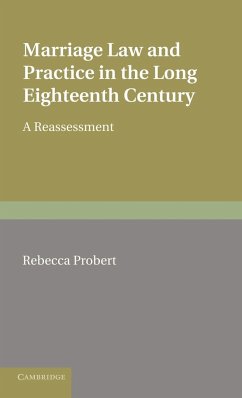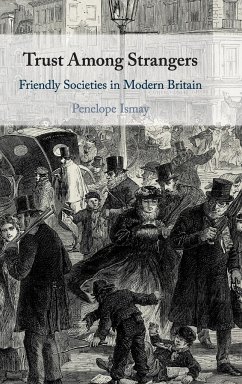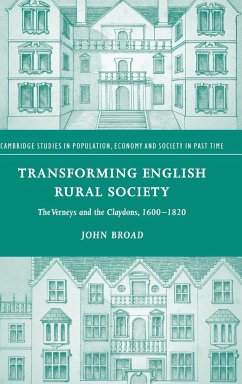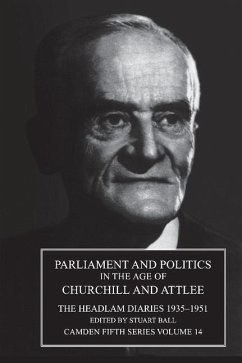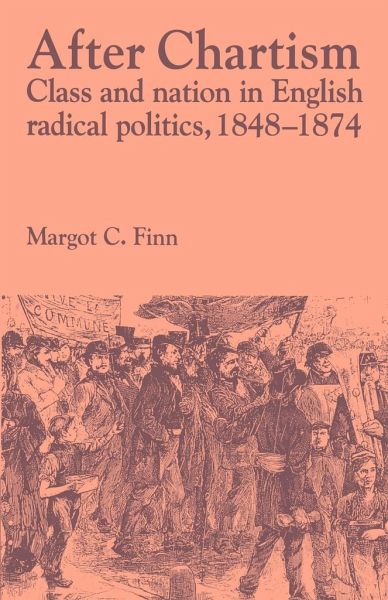
After Chartism
Class and Nation in English Radical Politics 1848 1874
Herausgeber: Roper, Lyndal
Versandkostenfrei!
Versandfertig in 1-2 Wochen
35,99 €
inkl. MwSt.

PAYBACK Punkte
18 °P sammeln!
Working- and middle-class radical politics in England from the fall of Chartism in 1848 to the 1870s.This book charts the course of working- and middle-class radical politics in England from the continental revolutions of 1848 to the fall of Gladstone's Liberal government in 1874. The author traces the genealogy of English radicalism from its roots in Protestant Dissent and the seventeenth-century revolutions, but also shows how this shared radical tradition was problematized by middle-class radicals' acceptance of classical liberal economics. She traces the lineaments of this divide by contra...
Working- and middle-class radical politics in England from the fall of Chartism in 1848 to the 1870s.
This book charts the course of working- and middle-class radical politics in England from the continental revolutions of 1848 to the fall of Gladstone's Liberal government in 1874. The author traces the genealogy of English radicalism from its roots in Protestant Dissent and the seventeenth-century revolutions, but also shows how this shared radical tradition was problematized by middle-class radicals' acceptance of classical liberal economics. She traces the lineaments of this divide by contrasting middle- and working-class responses to the continental revolutions of 1848-9, to the Polish and Italian nationalism of the 1860s, and to the Paris Commune in 1871. She argues that these years witnessed not the relentless liberalization of working-class radical protest in England, but rather a significant diminution of middle-class radicals' commitment to liberal economics. This accommodation contributed to the emergence of the 'New Liberalism' of the 1880s, and helped to shape middle- and working-class responses to the early socialist movement.
Table of content:
List of illustrations; Acknowledgements; List of abbreviations; Introduction; 1. Nation and class in the English radical tradition; 2. English radical responses to the revolutions of 1848-1849; 3. Working-class radical culture in the decade after 1848; 4. Bourgeois radical nationalism and the working class, 1848-1858; 5. Nationalist fervour and class relations, 1848-1864; 6. The Reform League, the Reform Union, and the First International; 7. Republican revival: Liberals, radicals, and social politics, 1870-1874; Conclusion; Bibliography; Index.
This book charts the course of working- and middle-class radical politics in England from the continental revolutions of 1848 to the fall of Gladstone's Liberal government in 1874. The author traces the genealogy of English radicalism from its roots in Protestant Dissent and the seventeenth-century revolutions, but also shows how this shared radical tradition was problematized by middle-class radicals' acceptance of classical liberal economics. She traces the lineaments of this divide by contrasting middle- and working-class responses to the continental revolutions of 1848-9, to the Polish and Italian nationalism of the 1860s, and to the Paris Commune in 1871. She argues that these years witnessed not the relentless liberalization of working-class radical protest in England, but rather a significant diminution of middle-class radicals' commitment to liberal economics. This accommodation contributed to the emergence of the 'New Liberalism' of the 1880s, and helped to shape middle- and working-class responses to the early socialist movement.
Table of content:
List of illustrations; Acknowledgements; List of abbreviations; Introduction; 1. Nation and class in the English radical tradition; 2. English radical responses to the revolutions of 1848-1849; 3. Working-class radical culture in the decade after 1848; 4. Bourgeois radical nationalism and the working class, 1848-1858; 5. Nationalist fervour and class relations, 1848-1864; 6. The Reform League, the Reform Union, and the First International; 7. Republican revival: Liberals, radicals, and social politics, 1870-1874; Conclusion; Bibliography; Index.








